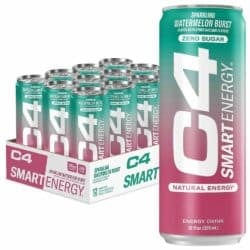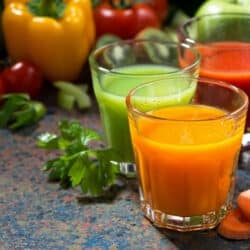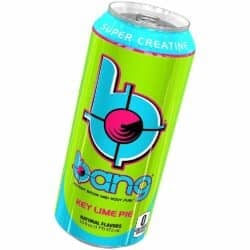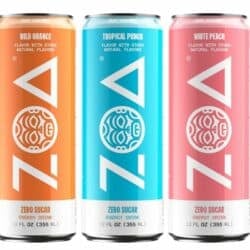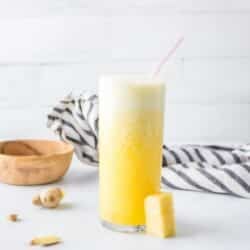Is Lotus Energy Drink Healthy (From a Nutritionist)?
In this blog post, I’ll review whether Lotus Plant Power Drink is healthy. I’ll also explain this product’s nutrition pros and cons and suggest some better options. For most people, it would be healthier to consume real whole foods for energy as opposed to a canned highly-processed drink made with preservatives and natural flavors.
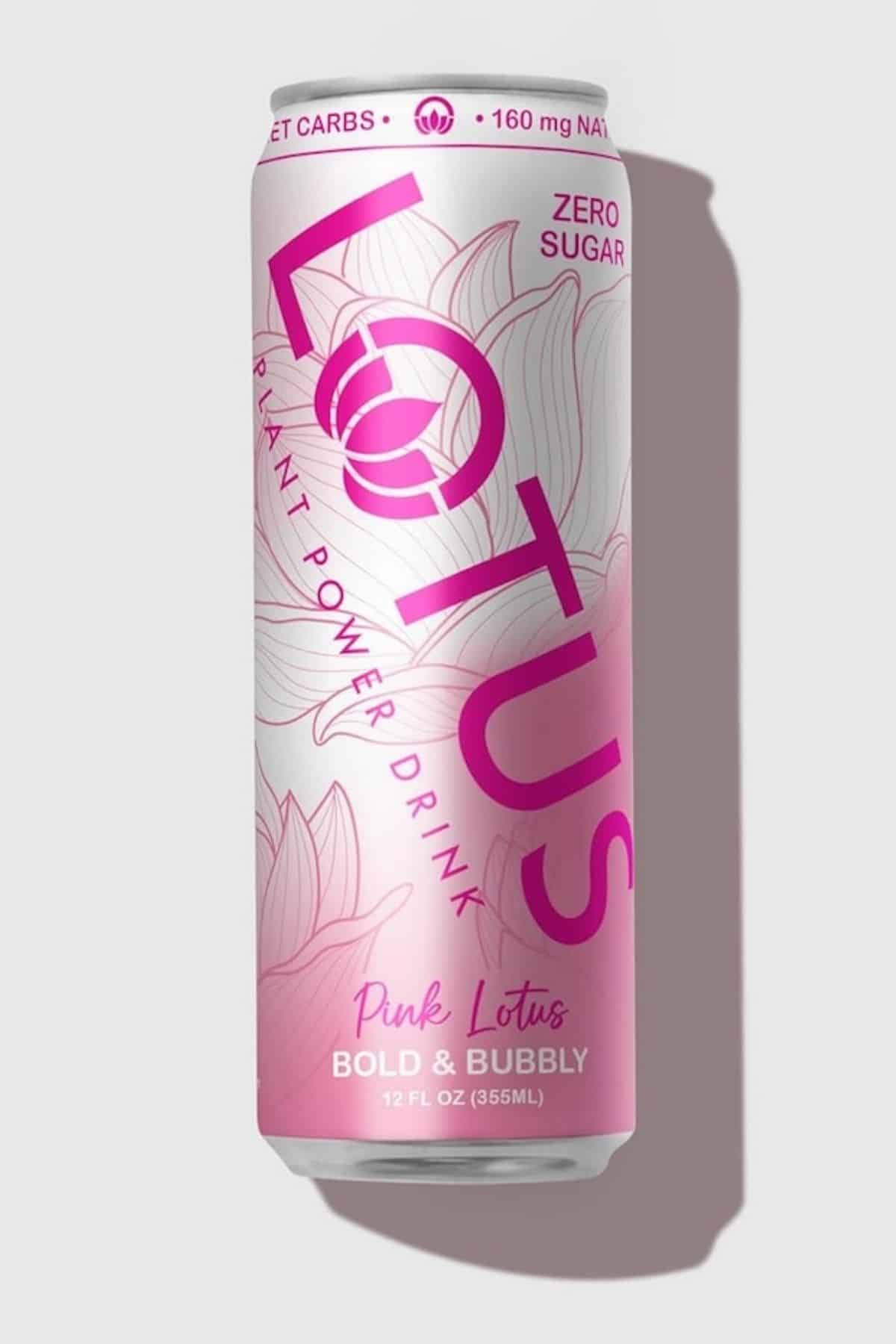
Lotus Plant Power Drink Facts
Lotus Plant Power Drink is a vegan, plant-based, gluten-free energy drink. The company launched its first line of lotus flower energy drinks in 2007.
Lotus Plant Energy was later formulated with a unique proprietary plant-based formula called Plant Power Seven (PP7™).
According to Lotus Plant Energy’s website, this formula contains seven of “Earth’s power plants” to help promote life force energy for people looking for better mental focus and stress relief, to help support gut health, and to build immune defense.
The seven “power plants” used to make Lotus Plant Power Drinks are:
- Cascara (coffee fruit)
- Green coffee beans
- Ashwagandha
- Guayusa tea
- Prebiotics
- Elderberry extract
- Green Tea Extract
Lotus Plant Power Drinks contain 160mg of caffeine and 160mg of sodium.
They are available in 8 flavors, including Gold Lotus Plant Power Drink™(Pure Cane Sugar), Gold Lotus Plant Power Drink™, Pink Lotus Plant Power Drink™, Blue Lotus Plant Power Drink™, Red Lotus Plant Power Drink™, Purple Lotus Plant Power Drink™, Green Lotus Plant Power Drink™, and Orange Lotus Plant Power Drink™.
Each drink is available in a 12 oz can in a 12-pack of the same flavor or in a variety 12-pack.
Lotus Plant Power Drink Ingredients
The Pink Lotus Plant Power Drink™ (zero sugar) includes the following ingredients:
- Carbonated water
- Allulose
- Natural flavors
- Citric acid
- Sodium citrate
- Caffeine from green coffee beans
- Potassium sorbate (preservative)
- Sodium benzoate (preservative)
- Plant Power 7™ proprietary blend, which includes:
- Coffee fruit (cascara) extract
- Ashwagandha KSM-66 extract
- Elderberry extract
- Schisandra berry extract
- Lotus flower extract
- Rhodiola rosea extract
- Green tea extract
- Natural color (fruit and vegetable juice)
Let’s examine some of the main ingredients in Lotus Plant Power Drink and what they might mean for your health.
Allulose
Allulose, a low-calorie sweetener manufacturers use in some foods and beverages, is often marketed as a healthier alternative to traditional sugars because it has a low glycemic index and minimal impact on blood sugar levels.
However, despite these benefits, there are some unhealthy aspects to consider.
Consuming allulose in large quantities can cause digestive issues, including bloating, gas, and diarrhea, as your body doesn’t fully absorb it. Instead, it ferments in the colon.
Sodium Citrate
Food manufacturers use sodium citrate as a flavor enhancer and acidity regulator in food and beverage products.
Consumed in moderate amounts, sodium citrate is considered safe by regulatory agencies. However, consuming this additive in large quantities can cause certain health problems, especially for people with specific sensitivities.
Consuming excessive amounts may lead to increased sodium levels in the blood, potentially causing hypertension or elevating already high blood pressure levels.
Individuals on restricted sodium diets or with kidney issues should be cautious since sodium citrate can also contribute to electrolyte imbalances. It is crucial to regulate your overall sodium intake.
Natural Flavors
The term “natural flavors” on food labels lacks a precise definition, which can confuse health-conscious consumers.
This ambiguity allows food and beverage manufacturers to label ingredients as “natural,” even when the components or methods used to produce the flavor may not be entirely good for you.
For instance, the nutrition label on Lotus Plant Power Drink does not clearly specify how its natural flavors are derived or extracted. This vagueness raises the possibility that these flavors could be synthetic or produced using unhealthy extraction methods.
Some food and beverage manufacturers use techniques like enzyme-assisted extraction involving solvents or high temperatures. These methods are often not disclosed to the public or may be classified as “incidental additives.” The absence of a clear, standardized definition for this term also means that genetically engineered crops can be labeled as “natural flavor.”
It is important to note that certain natural flavors, such as sesame, may contain allergens, but manufacturers are not required to disclose this information to consumers.
This lack of transparency may pose significant risks for individuals with allergies or sensitivities. Stricter regulations and clearer labeling practices can help you make informed decisions about your health and safety.
Beta-Alanine
Beta-alanine, a popular ingredient in many pre-workout supplements and energy drinks, enhances athletic performance by buffering lactic acid buildup in muscles, delaying fatigue.
However, consuming this ingredient comes with some potentially unhealthy aspects.
One of the most common side effects is paresthesia, a tingling sensation on the skin that, while temporary, can be uncomfortable.
For individuals sensitive to stimulants or those with pre-existing health conditions, excessive intake of beta-alanine may exacerbate these issues, making it essential to use this supplement with caution.
Caffeine
Caffeine is also a popular ingredient and widely used stimulant found in coffee, tea, energy drinks, and various food products.
While moderate caffeine intake can boost alertness and energy, overconsumption can pose significant health risks and cause several adverse effects.
Some of the potential health problems can include increased heart rate, anxiety, high blood pressure, and insomnia. Regular intake of high doses may also contribute to dependency, leading to withdrawal symptoms like headaches, irritability, and fatigue when not consumed.
Caffeine is also a diuretic, so it can cause dehydration, and its potential to disrupt sleep patterns can have long-term consequences on mental and physical health.
For individuals sensitive to caffeine or with certain health conditions, even moderate consumption can trigger these adverse effects.
Sodium
Since the daily recommended limit for adults is 2,300, consuming 160 mg of sodium in an energy drink may not pose significant health concerns for most individuals.
However, monitoring sodium consumption is crucial for individuals with certain health conditions, such as hypertension or heart disease.
Nutrition Pros
Lotus Plant Power Drink is formulated with plant-based ingredients and comes in a convenient can, offering a quick way to boost energy levels.
It is vegan and gluten-free.
Nutrition Cons
While Lotus Plant Power Drink markets itself as a healthier alternative than other energy drink brands, it still has several unhealthy aspects to consider.
First, this is a highly processed product made with preservatives and other ingredients formulated in a lab.
It’s always better to consume whole foods or unprocessed foods and beverages.
For energy, consider coffee, tea, or a protein smoothie made with natural ingredients for healthy energy. Try my recipe for Protein Coffee, for example. Or, see my article with the strongest espresso at Starbucks.
See my related reviews on “Why Premier Protein is Bad For You” and “Are Alanis Bad For You?“
Compared to other caffeinated beverages, the drink is relatively expensive, and the environmental impact of the single-use cans is another drawback, contributing to waste and resource consumption.
I do not consider Lotus Energy Drink to be part of a clean eating approach.
Don’t Miss These Energy Drink Reviews
Conclusions
Lotus Plant Power Drink positions itself as a cleaner option than many traditional energy drinks, with its vegan and gluten-free plant-based ingredients and lack of added sugar in most flavors.
While it does offer a few notable benefits, this product still contains ingredients like sodium, beta-alanine, natural flavors, allulose, and caffeine, which can cause health problems or may not be suitable for everyone.
Additionally, the environmental impact of its packaging and the relatively high cost per serving are factors to consider. For healthier alternatives, choose herbal teas, natural juices, or simply staying hydrated with water to provide energy without the potential downsides of manufactured energy drinks.
Don’t forget to join my newsletter list to get exclusive clean eating recipes and tips. The newsletter is 100% free with no spam; unsubscribe anytime.
About the Author: Carrie Forrest has a master’s degree in public health with a specialty in nutrition and is a certified holistic nutritionist. She is a top wellness and food blogger with over 5 million annual visitors to her site. Carrie has an incredible story of recovery from chronic illness and is passionate about helping other women transform their health. Send her a message through her contact form.
Note: this post is for informational purposes only and is not intended as medical advice. Please consult your healthcare provider for recommendations related to your individual situation.



